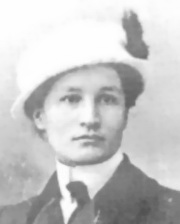Divna Veković
Divna Veković ( Cyrillic Дивна Вековић ; * 1886 in Lužac (Лужац) municipality of Berane , Principality of Montenegro ; † 1944 in Zidani Most , Yugoslavia ) was the first Montenegrin female doctor as well as an author and translator .
Life
Divna Veković's parents were Tole and Urosa Veković. Divna attended the Đurđevi Stupovi monastery school and high schools for girls in Skopje and Cetinje . With a grant from the Empress Maria Institute, Veković was able to go to France . There she graduated from the midwifery school in Amiens . Veković studied medicine at the Sorbonne and received two years of training in dentistry .
During the First World War , Veković worked for the Red Cross on the Saloniki Front . She organized numerous humanitarian campaigns to send food, relief supplies and medicine. King Peter I of Serbia awarded them the Order of the Karađorđe Star with Swords .
In addition to her work as a doctor, Veković was the first to translate the Montenegrin national epic Gorski Vijenac , published in 1847, into French . King Nikola honored her with a valuable brooch with the author's portrait. She also translated the works of the pediatrician and poet Jovan Jovanović Zmaj (1833–1904) and fairy tales and legends by Vuk Stefanović Karadžić (1787–1864). As an author, she has written a number of dictionaries that have appeared in Paris and Belgrade . Veković was awarded the Legion of Honor for her linguistic work . She also published ethnological works. In addition to Serbian and French, she also spoke Italian, English and Russian.
In 1926 Veković received his doctorate from the University of Belgrade with a thesis on vascular surgery . She also taught at the high school in Berane .
During the Second World War , Veković was active in the health sector and was again involved in humanitarian activities. Her language skills came in handy during negotiations.
Divna Veković died at the end of the war under circumstances that were never clarified. It is said that as a supporter of the monarchist side near Zidani Most, she was killed by partisans and thrown into the Save .
The Đurđevi Stupovi monastery feeds the poor on their behalf .
Works (selection)
- «Крвни умир». Dissertation Belgrade 1926, 1931.
- «Француска граматика». (Grammaire franco-serb) . Paris 1916.
- “Српско-француски разговори”. - Manuel de conversation serbe-français . Rodstein, Paris 1916.
- Dictionnaire serb français (avec prononciation figurée) . Rodstein, Paris 1917.
- «Француско-српски речник». - French-Serbian dictionary . Rodstein, Paris without a year.
- «Француско-српски речник. награђен од стране Француске Академије наука ». (Francusko-srpski rečnik) Геца Кон, Belgrade 1924.
- «Српско-француски речник. награђен од стране Француске академије наука ». Геца Кон, Belgrade 1924.
- Francuski učitelj za jugoslovenske iseljenike u Francuskoj. - Guide de la langue française pour les Yougoslaves (conversation et grammaire) . Les Éditions internationales, Paris 1937.
- Vie et coutumes du peuple serbia . In: Ethnography . No. 17/18 (1928), pp. 9-29.
- National Costume of the Tzrna Gora de Skoplyé . Société d'ethnographie de Paris, Paris 1936.
- Translations
- Pierre II Pétrovitch-Niegoch : Les Lauriers de la Montagne (Gorski Viyénatz) . Berger-Levrault, Paris 1917.
- Editor
- Vuk Stefanović Karadžić : Contes populaires serbes. Recueillis d'après Vouk Karadjitch by Divna Vékovitch, avec la collaboration de M. Ginier. Editions Internationales, Paris 1934.
literature
- Marina Martinović; Vladimir Jokanović: Divna Veković (1886–1944), prva lekarka u Crnoj Gori. In: Medicinski pregled . Volume 59 (2006) No. 7-8. Pp. 391-393 (Serbian).
Web links
- Епархија Будимљанско-никшићка: «ПОВЕЋАВА СЕ БРОЈ КОРИСНИКА НАРОДНЕ КУХИЊЕ" ДИВНА ВЕКОМВИЋ "У БЕР". (Serbian, pravoslavie.ru of October 10, 2017; with photo)
- medicalcg.me: Prva ljekarka u Crnoj Gori - Divna Veković (1886–1994) . (Bosnian)
- Montenegrin Women's Museum: Veković Divna . (Montenegrin)
Notes and individual references
- ↑ According to other information, she received her doctorate in literature.
- ↑ novosti.rs : Tajanstvena heroina opet pruža utočište . (Serbian, from April 19, 2017)
| personal data | |
|---|---|
| SURNAME | Veković, Divna |
| ALTERNATIVE NAMES | Vékovitch, Divna (French name); Вековић, Дивна (Serbian) |
| BRIEF DESCRIPTION | Montenegrin doctor, author and translator |
| DATE OF BIRTH | 1886 |
| PLACE OF BIRTH | Lužac, Berane Municipality , Principality of Montenegro |
| DATE OF DEATH | 1944 |
| Place of death | Zidani must |
